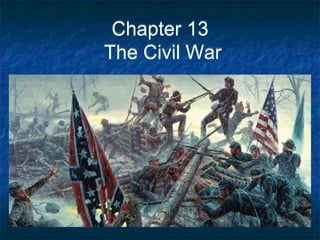
How the US Would Have Changed if the Confederacy Won the Civil War
- 1. Chapter 13 The Civil War
- 2. Essential Question……… How would the United States have changed if the Confederacy had won the war??
- 3. Sides compared North/Union - South/Confederacy
- 4. Sides compared North/Union - South/Confederacy Population: North: 20 million people South: 9 million people - including 3.6 million slaves.
- 5. Sides compared North/Union - South/Confederacy Railroads: North: 22,000 miles of railroad track. South: 9,000 miles of railroad track.
- 6. Railroads Attacking armies had to carry enormous supplies of ammunition, food and bandages. The railroad, which had never been used much in war before, was now an important factor.
- 7. Sides compared North/Union - South/Confederacy The North had more factories, factory workers, more money, more banks, more bank credit, more ships, more locomotives, more steel and iron, more farm machinery, and more firearms.
- 8. Sides compared North/Union - South/Confederacy North: Grew a variety of crops. South: Grew only a few staple crops - tobacco, cotton and rice- which it had to import in order to obtain all the things it lacked. Quic kTime™ and a decompres sor ar e neede d to s ee this picture.
- 9. Sides compared North/Union - South/Confederacy North:relied on labor saving devices like the reaper, for farming - freeing up men for the army. South: relied on slave labor - which could turn on the south at anytime.
- 10. The Reaper
- 12. The Rifle
- 13. QuickTime™ and a decompressor are neede d to see this picture. QuickTime™ and a decompressor are neede d to see this picture.
- 14. •The rifle was called so The Rifle because the inside of the barrel was rifled - or cut with spiral grooves. • When the bullet was pushed out of the barrel, it was released spinning. •This gave it a longer range(500 yards instead of 50 yards)and more accurate aim.
- 15. Digging in! The style of war was changing. With more accurate long-range rifles, the defenders sat protected behind battlements in well supplied positions. Armies could no longer confront each other in solid ranks.
- 17. QuickTime™ and a decompressor are neede d to see this picture.
- 18. QuickTime™ a nd a decompressor are need ed to see this picture.
- 19. The “war of exhaustion”
- 20. The “war of exhaustion” This new kind of was a war of exhaustion. Enemy supplies had to be cut off by railroads, as well as water.
- 21. The “war of exhaustion” The North had to capture or blockade the southern ports and coasts in order to stop supplies from being delivery to the South.
- 22. “Conda” - pg. 336
- 24. Everybody’s War In both the North and the South nearly every family lost a soldier. For the first time in history, the battle were thoroughly covered by newspaper correspondents. They telegraphed back eyewitness accounts so that civilians could read about the horror the next morning.
- 25. Women at War Dorothea Dix, on June 10, 1861, was appointed the first Superintendent of Women Nurses. QuickTime™ and a decompressor are neede d to see this picture.
- 26. Women at War Clara Barton, in 1877, founded and became president of the American Red Cross. QuickTime™ an d a decompressor are need ed to see this picture .
- 28. The Border States When the war began, Lincoln was not even sure who was on his side or whether Washington D.C. could even be held. It was surrounded on three sides by Maryland, a slave state. If Maryland was to succeed, Washington D.C. would be lost.
- 29. The Border States Lincoln imposed martial law in Maryland in order to control it, suppressing newspapers, arresting civilians and even refusing to let them appear before civilian judges. This is called suspending the writ of habeas corpus.
- 30. The Question of Emancipation.
- 31. The Question of Emancipation. At the beginning of the war, in order to keep in the Union the border slaves states - Delaware, Maryland, K entucky, and Missouri QuickTime™ an d a decompressor are need ed to see this picture. - Lincoln refused to emancipate the slaves.
- 32. The Question of Emancipation. When (Union)General Fremont, commander of the Western Department, on August 30, 1861, freed the slaves of rebels in Missouri, Lincoln stepped in firmly and overruled him.
- 33. The Question of Emancipation. As much as Lincoln, would of like to free the slaves, his first job was to save the Union.